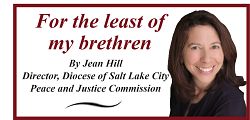Living the Communion of Saints
Our secular world tends to think in black and white. For example, there is a tendency to see people who agree with me as good, and people who do not as evil. Catholicism, on the other hand, recognizes good and evil in each of us, hence Christ’s sacrifice on the Cross to save every one of us from our poor decisions and bad acts.
Our Eucharistic celebration should remind us that the world is not black and white, and each of us is both sinner and saint. We hear every time we attend Mass Jesus’ words at the Last Supper, offering the bread and the cup of life for our salvation.
We also hear that we are part of the Communion of saints. Saints who did not become saints by sitting at home fuming about politics or listening to pundits encouraging them to be afraid or dismissive of others. Instead, our saints went out into the world sharing the message of the Gospel, a message that challenges each of us to recognize that when one member of our common humanity is suffering, we are all wounded. Our role on this earth is not to fear one another, but to care for one another, locally and globally.
Living the Eucharist, as we are asked to do when we “go forth” from Mass, means living our covenant with God to care for the poor, the widow, the orphan, the alien. Were we fully living our covenant with God, I suspect we would live in a vastly different world.
For example, if we lived our Church teaching to provide preferential option to the poor, we might be more than willing to give up our over-consumption of the world’s resources, or to, in the words of St. Elizabeth Seton, live simply so others may simply live.
If we fully lived our belief in the Communion of Saints, we would challenge secular messages that claim some lives are less worthy of living than others, whether those lives are lived on death row, in the womb, in deep addiction, or with disabling conditions that make a person more reliant on others than they might wish to be.
We would similarly challenge messages claiming that recognition of sin is harmful, that we should ignore history that makes us feel bad rather than striving to improve the structures that continue to leave any portion of humanity suffering in poverty or despair. Catholics living the Eucharistic celebration should have no fear of cleaning up our Church scandals and addressing systemic racism – both of which wound our brothers and sisters in Christ.
We who believe God sent his only son for our salvation, we who listen to the Gospel message every Sunday of love for our neighbor, have a far more powerful message to share than the one we see across the myriad media outlets every day. While secular society preaches a message of us versus them, our message is one of higher purpose, of care for all, of healing the wounds of others because we will all be judged not by what we have, but by what we have done for the least of our brothers and sisters.
Christ suffered a horrendous death so he could rise again for us; the least we can do is try and live consistent with his message of care for all of creation, including each other, even – and especially – when doing so makes us uncomfortable.
Jean Hill is director of the Diocese of Salt Lake City Office of Life, Justice and Peace. Reach her at jean.hill@dioslc.org.
© Copyright 2024 The Diocese of Salt Lake City. All rights reserved.


Stay Connected With Us